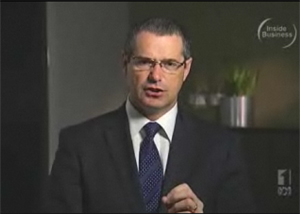Small ISPs should start small: Conroy

Communications Minister Stephen Conroy has dismissed Internode's concerns that National Broadband Network (NBN) pricing would force smaller ISPs out of the national market, stating that new players wouldn't necessarily be national right away.

Communications Minister Stephen Conroy (Screenshot by Josh Taylor/ZDNet Australia)
Internode's managing director Simon Hackett last week raised concerns that the high price for using a Connectivity Virtual Circuit (CVC) at each of the 121 points of interconnect (POI) where NBN Co hands over NBN traffic to internet service providers (ISPs) would mean that smaller internet service providers (ISPs) serving less than 250,000 customers would be priced out of supplying services on a national level.
Conroy told the ABC's Inside Business yesterday that the government preferred a 14 POI model for the NBN, which would have resulted in lower costs for smaller ISPs serving a national market; however, the decision on 121 POI was made by the Australian Competition and Consumer Commission (ACCC).
"The complaint being made by Internode is a very important contribution, and it would've been really fantastic for Internode to have made that argument to the ACCC. And while the government and NBN supported 14 POIs, the final decision was that recommended by the ACCC. So this is a complaint about what the ACCC decided, and unfortunately Internode chose not to put in a submission."
Internode made two submissions to the POI ACCC inquiry, and while the company advocated 14 POI in those submissions, the company made no reference to CVC costings at the time. Conroy said that smaller ISPs may opt to simply service individual POI first rather than going national.
"There's many who would argue that a small start-up company may not want to seek access to all of the 121 sites at the beginning. They would want to grow as a strategy to become a national company," he said. "So Simon's analysis is based on a number of assumptions. There's nothing wrong with his assumptions, but there are many who would dispute and say that a start-up company wouldn't necessarily try and be a national company on day one."
Late on Friday, Hackett posted a blog detailing how NBN Co could address this issue without compromising the bottom line.
According to Hackett, if the CVC cost was reduced from $20 per megabit to $1 per megabit, and the charge for a customer port was increased from $24 to $25.63, this would balance the pricing in a way that wouldn't disadvantage the smaller ISPs, which would otherwise be forced to wholesale from a larger telco such as Telstra or Optus.
"While income below 250,000 customers would appear lower for NBN Co in the rebalanced model, in reality it will be the same or greater," he said. "That's because without this rebalancing, there will simply be no direct customers of NBN Co below the 250,000 level, with those smaller providers being forced into the uncomfortable position of having to buy access at a mark-up from one of their much larger retail competitors."